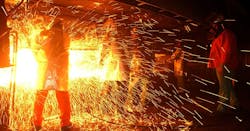Commerce Secretary Says Steel Tariff Decision Will Wait Until After Tax Reform
Commerce Secretary Wilbur Ross said the Trump administration has decided to defer a decision on steel tariffs as it focuses on getting tax reforms through Congress.
“The policy decision has been made to postpone that until the tax bill,” Ross said Friday in an interview on Bloomberg Television, when asked about his department’s review of the national-security implications of steel imports.
Commerce will give President Donald Trump a range of options when it reports its findings on the steel investigation. But overhauling the tax system is the “single most important”’ thing on the administration’s agenda, one that will drive job creation, he said.
“It’s not so much a question of backing away, it’s a question of timing,” Ross said earlier Friday in an interview on CNBC, in which he was asked repeatedly about when his department would announce trade decisions, including on steel. “Tax is extremely important because that’s the biggest single incremental factor in getting growth over 3%,” he said.
The administration doesn’t want to “unnecessarily irritate” lawmakers as it builds support for a bill to overhaul taxes, Ross said.
Commerce has been investigating the impact on national security of steel imports under seldom-used Section 232 of the Trade Expansion Act of 1962. While Trump has threatened to impose tariffs on foreign steel, Commerce has yet to report its findings, despite months of speculation that a ruling is imminent. Steelworkers traveled to Washington this week to protest the delay, saying the U.S. industry is being hurt by foreign dumping.
Ross made clear that the administration is focused on implementing tax reforms, including cuts to corporate taxes. “There are plenty of other trade issues besides steel,” he said, citing talks on a new North American Free Trade Agreement. The third round of talks with Mexico and Canada will take place in Ottawa Sept. 23-27.
Group of 20 economies have pushed back against the threat of steel tariffs, warning that such a move could set off a trade war. Section 232 allows the president to adjust imports unilaterally without a vote by Congress, should Commerce find evidence of a national-security threat from foreign shipments.
The Trump administration in particular wants to pressure China to reduce excess steel capacity that’s affecting global prices, while boosting cooperation with the world’s second-largest economy in addressing the threat posed by North Korea. Ross said he’s leaving on Saturday for an official visit to Beijing.
By Andrew Mayeda
About the Author
Bloomberg
Licensed content from Bloomberg, copyright 2016.
